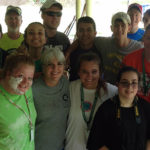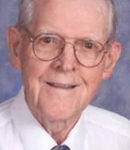Bill O’Brien is the executive director of the Gaston Christian Center in Dallas. From deep in the heart of one Texan, he shares his background and thoughts on church and ministry. To suggest a Baptist General Convention of Texas-affiliated leader to be featured in this column, or to apply to be featured yourself, click here.
BACKGROUND
What was the ministry position or leadership role by which most people know you?
The ministry position by which most people know me is that of missionary and missions administration. My family served two terms in Indonesia in the field of music and the arts. I was also director of radio/television for Indonesian Baptists. That was followed by missions administration at the Foreign Mission Board in Richmond as a department head, then as executive vice president, covering a period of fourteen years.
Where did you grow up?
I went through elementary school in Big Spring, Texas, junior high and high school in Abilene, Texas, and graduated from Hardin-Simmons University in Abilene.
How did you come to faith in Christ?
My mother was my spiritual guide. Every Saturday morning, she taught me a Bible lesson before I could go out and play with my friends. One Saturday, I made my profession of faith kneeling at her knees and made my profession the next day at the church where my older brother was the pastor.
Why did you feel called into ministry?
During my senior year at Abilene High, I first began intuiting that vocational ministry might be for me. By spring of that year, a sense of calling emerged and I made that public at University Baptist Church, where Sterling Price was the pastor. I was in the acapella choir at Abilene High and in the church choir. Although music would be the channel of expressing my call, I did not major in music in college. That’s a whole other story.
Sign up for our weekly edition and get all our headlines in your inbox on Thursdays
In addition to your most-noted position, where else did you serve in ministry?
During our second home-leave from Indonesia, I studied further in the field of music. We began to feel God was not leading us back to Indonesia, a puzzling fact in the light of our deep involvement in the Indonesian culture and language. I continued to study, completing the coursework for a doctorate in music. For work, I served as an unofficial chaplain at a new development on Eagle Mountain Lake outside of Fort Worth. We began a Bible study that grew into a church, and I was asked to be the pastor. I served for two years in that position until I was asked to come to the home office of the Foreign Mission Board to direct a new department. I resigned from the Foreign Mission Board in 1991 to become the founding director of the Global Center at Samford University. I also taught missions in the Beeson Divinity School at Samford.
When did you leave your most-noted position and/or retire from full-time ministry?
After nine years at Samford, I took full retirement in 2000.
How have you occupied yourself since then?
We moved to Frisco, a suburb of Dallas, and became members at Preston Trail Community Church. When the tsunami hit Southeast Asia in 2004, we put together a community development organization to work with tsunami survivors in Aceh, Indonesia. When other churches heard how we went in, they wanted to partner with us. For the next eight years, I facilitated a network of several churches that provided personnel in the fields of medicine, agriculture, early childhood education, micro-finance and athletics. Also during that time, I served as mission scholar-in-residence at Baylor University’s Truett Seminary for two years.
I am currently serving as Executive Director of the Gaston Christian Center in Dallas that is home to eight congregations (seven of which are ethnic and comprised of immigrants), a separate ministry to immigrants, a medical/dental clinic for the underinsured, a tutoring ministry for at-risk elementary school children and the administrative offices of Bakke Graduate University, which grants masters and doctoral degrees for ministers and urban leaders on four continents.
Where do you live now, and where do you go to church?
I am now living in Dallas and am active at Wilshire Baptist church, serving as a deacon and a Sunday School teacher, and I sing in the choir.
MINISTRY/LIFE
What was your favorite or most joyful aspect of ministry? Why?
My favorite aspect of ministry came during the years in Indonesia. I loved the people, the language, the culture and the food. Cross-cultural living was a natural for me. During my first term, we lived through an attempted Communist coup. Both Christian and Muslim friends stood with each other to see a better day.
How did your perspective on ministry change?
My perspective on ministry had been shaped looking through a Baptist lens, having grown up Baptist. Living in the largest Muslim society in the world, I realized my view had been limited. It didn’t take a rocket scientist to understand that if the cause of Christ were to be served faithfully, it would take lifelong collaborative efforts by all believers and churches. To that I gave myself.
What would you tell the young you, just starting out in ministry?
For young women and men entering ministry, I would challenge them to engage in more holistic thinking. We grew up in a Western culture that commonly engages in dualistic, binary thinking: either/or, in/out, right/wrong, pretty/ugly. Father Richard Rohr reminds us that while binary thinking is necessary for many functions, it cannot process things like infinity, mystery, God, suffering, sexuality, death or love.
What do you wish more laypeople knew about ministry or, specifically, your ministry?
I wish more laypeople understood they are the ministers, not the church staff. Pastors and other staff members are laity also. Their gifts enable them to be playing coaches, who week by week prep all the ministers for their work in the market place.
How do you expect ministry to change in the next 10 to 20 years?
Over the next 10–20 years, hopefully ministry will be more outer-directed and taking on many forms. Mission is not engaging in projects; it is a lifestyle. Ministry is servanthood, taking whatever forms will meet the needs. Cell groups, house churches and other forms of togetherness will provide worship and training opportunities in the midst of an increasingly unsympathetic culture. The immigrant church coming north from the two-thirds world will provide some models for this.
ABOUT BAPTISTS
What were the key issues facing Baptists during the heart of your ministry?
Key issues facing Baptists during my ministry revolved around the controversy within the Southern Baptist Convention. The issue of inerrancy had been adopted as the battle cry and a well worked out plan for placing trustees on agency boards year by year resulted in achieving control of the agencies and seminaries. All this was occurring within the larger picture of national politics, the emergence of the Moral Majority, and the loss of relevant influence of the church in society.
ABOUT BILL
Who were/are your mentors, and how did/do they influence you?
I was fortunate to have significant persons who influenced me at differing points in my journey. Keith and Helen Jean Parks were influential in my call to Indonesia. After working as colleagues in Indonesia, Keith became my boss at the Foreign Mission Board. His commitment to Christ, his love for the word of God, and his management style greatly influenced me.
I met Ray Bakke when he was the Director of International Urban Associates in Chicago. As one of the most respected urban missiologists, his knowledge of world-class cities and his network of leaders in Africa, the Middle East and Asia was an inspiration. His approach spoke to what I had already learned in Indonesia about collaboration.
Odessa Woolfolk was the visionary who gave birth to the Birmingham Civil Rights Institute and became its lifelong president. She was a revered leader in Birmingham among blacks and whites. She was responsible for bringing me on the board of the institute, introducing me to a fast learning curve among champions of the civil rights movement.
Other than the Bible, name some of your favorite books or authors, and explain why.
Other than the Bible, a few authors and their books have greatly influenced me:
- “The Open Secret: An Introduction to the Theology of Mission” by Bishop Lesslie Newbigin
- “Transforming Mission: Paradigm Shifts in the Theology of Mission” by David Bosch
- “The Mission of God: Unlocking the Bible’s Grand Narrative” by Christopher J. H. Wright
- “Translating the Message: The Missionary Impact on Culture” by Lamin Sanneh
- “The Next Evangelicalism: Freeing the Church from Western Captivity” by Soong-Chan Rah.
What is your favorite Bible verse or passage? Why?
One of my favorite Bible verses is Romans 12:1–3. The whole idea of becoming a living sacrifice through the transformation of the mind is a daily challenge, not a one-time event.
Who is your favorite Bible character, other than Jesus? Why?
One of my favorite Bible characters is Barnabas, the encourager. My whole personality and character resonate with this man. His embrace of Paul upon his return to Jerusalem after Paul’s three years in “Wilderness Theological Seminary” took courage. His willingness to forego the second missionary journey with Paul to accompany young John Mark back home, which ultimately led to Mark’s traveling with Simon Peter and hearing all the stories that furnished him with material to write the gospel of Mark and finally becoming the revered Bishop of Alexandria—all this speaks volumes about Barnabas.














We seek to connect God’s story and God’s people around the world. To learn more about God’s story, click here.
Send comments and feedback to Eric Black, our editor. For comments to be published, please specify “letter to the editor.” Maximum length for publication is 300 words.